五升六语法翻译知识点
【提优拔尖】小学英语五升六暑假讲义专题三 ---- 一般过去时(一)
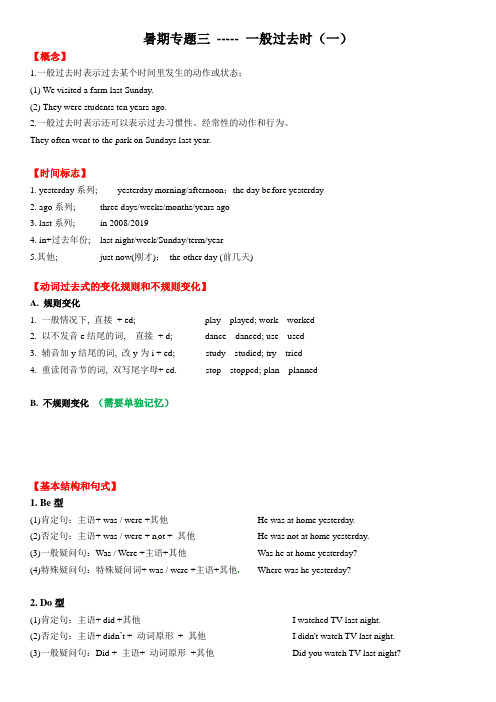
暑期专题三----- 一般过去时(一)【概念】1.一般过去时表示过去某个时间里发生的动作或状态;(1) We visited a farm last Sunday.(2) They were students ten years ago.2.一般过去时表示还可以表示过去习惯性、经常性的动作和行为。
They often went to the park on Sundays last year.【时间标志】1. yesterday系列; yesterday morning/afternoon;the day be fore yesterday2. ago系列; three days/weeks/months/years ago3. last系列; in 2008/20194. in+过去年份; last night/week/Sunday/term/year5.其他; just now(刚才);the other day (前几天)【动词过去式的变化规则和不规则变化】A. 规则变化1. 一般情况下, 直接+ ed; play---played; work---worked2. 以不发音e结尾的词, 直接+ d; dance---danced; use---used3. 辅音加y结尾的词, 改y为i + ed; study---studied; try---tried4. 重读闭音节的词, 双写尾字母+ ed. stop---stopped; plan---plannedB. 不规则变化(需要单独记忆)【基本结构和句式】1. Be型(1)肯定句:主语+ was / were +其他He was at home yesterday.(2)否定句:主语+ was / were + n ot + 其他He was not at home yesterday.(3)一般疑问句:Was / Were +主语+其他Was he at home yesterday?(4)特殊疑问句:特殊疑问词+ was / were +主语+其他Where was he yesterday?2. Do型(1)肯定句:主语+ did +其他I watched TV last night.(2)否定句:主语+ didn’t + 动词原形+ 其他I didn't watch TV last night.(3)一般疑问句:Did + 主语+ 动词原形+其他Did you watch TV last night?(4)特殊疑问句:特殊疑问词+ did + 主语+动词原形+其他What did you do last night?一般过去时专项练习一、写出下列动词的过去式1.am/is ______2. cry________3. read ________4. watch ________5. live _________6. take ________7. spend________8. drink_________9. fly________ 10.ride _______ 11.live _________ 12. give________13. do _______ 14. go ________ 15. have _______ 16 .cook_______17. cut ________ 18. clean _______ 19. think _______ 20. study_________二、用括号内所给词的适当形式填空1. We _________ (enjoy) ourselves at the party last night.2. The teacher told us that the moon_____(travel) around the earth.3. _______ you ______ (go) to the Great Wall last year?4. The old man _______(be)ill and went to see a doctor.5. We ________ (have) a party next Sunday.6. They _________(play) the guitar now.7. Did she ________ (have) supper at home?8. Jack ____________ (not clean) the room just now.9. _________ (be) it cold in your city yesterday?10. How many people ________ (be) there in your class last term?11. It ________ (be) hot yesterday and most children _______ (be) outside.12. There ________ (be) a football match on TV yesterday evening, but I _________ (have) no time to watch it.13. He ate some bread and _________ (drink) some milk.14. ________ he __________ (finish) his homewo rk last night?15. I__________(be) tired yesterday.16. I ___________(gain ) Arts degree last year.17. What _________ you ___________ (do) last night?18. My grandfather _________ (leave) Hong Kong for New York in 1998.19. What _______ he ________ (do) yesterday?20. Last week I _______ (buy) a new bike.21. He ________ (be) here just now.22. He __________ (not find ) his key last night.24. My father __________ (drink) a lot of wine yesterday.24. ________ you ________ (finish) your homework yesterday?25. Her mother __________ (not give) the girl any present.三、句型转换1. He came here last month. (改为否定句)He ______ ________ here last month.2. They played football this morning. (改为一般疑问句并作简略回答)—______ they _______ football this morning?—Yes, they _______./No, they _________ .3. They went to Beijing last year. (就划线部分提问)_________ _________ they ________ last year.4. Tom watched TV last night. (改为一般疑问句)_______ Tom _______ TV last night?5. Mary does homework every day. (用last night 改写句子)Mary ______ ________ ________ __________ .6. My family went to the beach last week. (划线提问)________ ________ ________ family _______ last week?7. I didn’t hav e any friends. (一般疑问句)________ _______ have _______ friends?8. She had many books in the room. (一般疑问句)________ she _________ many books in the room?9. Sally often did some reading in the morning. (否定句)Sally _______ often ______ some reading in the morning.10. She read some books in the room. (否定句)She __________ __________ ________ books in the room.四、改错题1. How is Jane yesterday? _______________________2. He go to school by bus last week. _______________________3. He often goes home at 6:00 last month. _______________________4. I can fly kites seven years ago. _______________________5. Did you saw him just now. _______________________6. Tom wasn’t watch TV last night. _______________________7. I didn’t my homework yesterday. _______________________8. He wait for you three hours ago. _______________________9. Who find it just now ? _______________________10. What did he last week? _______________________五、选择填空( ) 1. Lee ________ his mobile phone at home.A. leaveB. leavesC. leavedD. left( ) 2. _____ he ________ a good rest? No, he didn’t.A. Do, hadB. Did, haveC. Did, hadD. Was, had( ) 3. As soon as he ________, he ______ to his family.A. arrived, writesB. arrived, writtenC. arrive d, wroteD. arriveds, write ( ) 4. Mr. Black was late because he _______ his way.A. lostedB. loseC. losesD. lost( ) 5. When _________ Lee ________ school this morning?A. did, got toB. did, get toC. did, getD. did, got( ) 6. Will you please say it again? I ________ quite _______ you.A. didn’t, hearB. don’t, heardC. didn’t, heardD. don’t, hear ( ) 7. ______ you ________ at six o’clock yesterday?A. Do ,get upB. Did, get upC. Do, got upD. Did, got up( ) 8.What did you see _________?A. nowB. every dayC. these daysD. just now( ) 9.He went into the room and _______ the door.A. lockB. lockingC. locksD. locked( ) 10. —What _____ you _______ last week? —I bought a bag.A. did ,buyB. did , boughtC. do, buyD. do, bought( ) 11. —_____ he ____ his lunch? — Yes, he did.A. Does ,hasB. Does, haveC. Did, haveD. Did, had( )12.—Did the thieves _____ into the car? —No, they______.A. fell, didn’tB. fall(落下), didC. jump(跳), didn’tD. jump, did ( ) 13. -When did May come back from Hong Kong? -She __ from Hong Kong last Friday. A. come back B. comes back C. returned back D. came back ( ) 14. ____ she _____ this dictionary in the bookshop nearby last week?A. Did, buyB. Does, buyC. Did, boughtD. Does, buys ( ) 15. He ____ to the station this morning and was______ for the train.A. hurry, in timeB. hurries, on timeC. hurried, in timeD. hurried, at time ( ) 16. Where _____ Uncle Sun yesterday?A. wasB. wereC. didD. does ( ) 17. —Have you seen him today? —Yes, I ____ him this morning.A. seeingB. seeC. seesD. saw( ) 18. He ______ worried when he heard the news.A. isB. wasC. doesD. did( ) 19. There _____ a telephone call for my brother Steven yesterday?A. isB. areC. wasD. were( ) 20. Liu Fengwei _____ three yuan for the lost library book.A. paidB. payC. spentD. lost( ) 21. He ____ in this school in 1958.A. taughtB. teachC. teachesD. teaching( ) 22. They _____ tired so they stopped ____ a rest.A. are, haveB. were, haveC. were, to haveD. are, hav ing( ) 23. Yesterday I _____ in bed all day because I had a fever.A. layB. lieC. laidD. lied( ) 24. It was raining hard when he ____ home.A. gotB. getC. getsD. was getting( ) 25. She said her brother ____ in Beijing. He ______ to Japan on business last week.A. wasn’t, wentB. hasn’t, wentC. wasn’t, goD. isn’t, went一般过去时专项练习答案一、写出下列动词的过去式(略)二、用括号内所给词的适当形式填空1. enjoyed2. travels3. Did; go4. was5. will have6. are playing7. have8. didn’t clean9. Was 10. were11. was; were 12. was; had 13. drank 14. Did finish 15. was16. gained 17. did do 18. left 19. did do 20. bought21. was 22. didn’t find 24. drank 24.Did finish 25. didn’t give三、句型转换1. didn’t come2. Did play ; did; didn’t3. Where did go4. Did watch5. did homework last night6. Where did your go7. Didn’t you have8. Did have9. didn’t do 10. didn’t read any四、改错题1. is --- was2. go ---- went3. goes---- went4. can ---- could5. saw---- see6. wasn’t ---- didn’t7. didn’t --- didn’t do8. wait --- waited9. find --- found 10. he ---- he do五、选择填空DBCDB ABDDA CCDAC ADBCA ACAAA。
【提优拔尖】小学英语五升六暑假讲义专题六 ---- 六年级上册 Unit 1新课讲义

暑期专题六------ 六年级上册Unit 1 新课讲义Story time知识点1. make new clothes for you中make一词用法make的含义有: 1. 制作2. 让;使常见用法:让某人做某事make sb. do sth. 让某人不要做某事make sb. not do sth.2. show the king his new c lothes中show一词用法Show的常见搭配:1. 带某人参观某地show sb around sth.2. 给某人展示某物show sb. sth. = show sth. to sb.3. 当sth. 为人称代词it; them时,只能用show it/them to sb.类似show的一词用法的单词有:send sb. sth. = send sth. to sb. 给某人发送某物Give sb. sth. = give sth. to sb. 给某人某物3. try on these magic clothes中try on词组的用法试穿某物try sth. on 当sth.为代词it; them; 代词必须中间try的用法: 试图做某事try to do sth.尽某人最大的努力做某事try one’s best to do sth.4. walk through the city 中through一词的用法through强调从物体的内部穿过go through the tunnel(隧道); walk through the forestacross 强调从物体的表面穿过go across the road5. in his new clothesin + sb’s 衣服表示穿…..衣服;in + 颜色表示穿…..颜色的衣服wear sth. = be in sth. (注意:做句子的谓语动词时,要加上be动词;如果用来修饰名词,be动词不需要)put on 强调穿的动作;穿上wear 强调穿的状态;穿着be in 强调穿的状态;穿着6. point at the king中point的用法常见搭配:point at / point to sth./ sb.指着;laugh at sb.嘲笑某人7. fit well 很合适fit一词的用法: 1. fit作为形容词表示健康的;keep fit保持健康2. fit 作为动词表示合适;fit sb. well 很合身Grammar time知识点一般过去时:基本概念:一般过去时表示①过去某个时间里发生的动作或状态;②过去习惯性. 经常性的动作. 行为。
五六年级小升初小学英语语法+66页

第一章词类一、概念:根据词的形式、意义及其在句中的作用将词分为若干类,叫做词类。
二、分类(10类):1:实词(有实义)①名词(noun,缩写为n.)是人和事物的名称。
pen(钢笔),English(英语),life(生活)。
②代词(pronoun,缩写为pron.)是用来代替名词、数词的词。
we(我们),his(他的),all(全部)。
③动词(verb,缩写为v)表示动作和状态的词。
write(写),eat(吃),sing(唱歌)。
④形容词(adjective,缩写为adj.)用来修饰名词或代词,表示人或事物的特征。
great(伟大的),honest(诚实的),difficult(困难的)。
⑤副词(adverb,缩写为。
adv.)是修饰动词、形容词和副词的词。
quickly(快),often(经常),very(很)。
⑥数词(numeral,缩写为num.)是表示"多少"和"第几"的词。
four(四),eighteen(十八),first(第一),eighth(十八),hundred(百),thousand (千)2:虚词(没有实义)①介词(preposition,缩写为prep.)说明词与词之间关系的词。
from(从),in(在…内),between(在…之间)②连词(conjunction,缩写为conj.)是连接词与词或句与句的单词。
and(和),because(因为),but(但是)。
③冠词(article,缩写为art.)用在名词前,说明名词的意义。
a,an(一个),the(这,那)。
④感叹词(interjection,缩写为int.)表示喜怒哀乐感情的词。
oh(噢),aha(啊哈),hi(嗨)。
[注]不少词可以属于几个词类,如work(工作;动词和名词),fast(快;形容词和副词),since(自从;连词和介词)等。
词类记忆口诀:英语十类词,一定要记住。
五升六暑期英语教案第12课时 --There be 句型
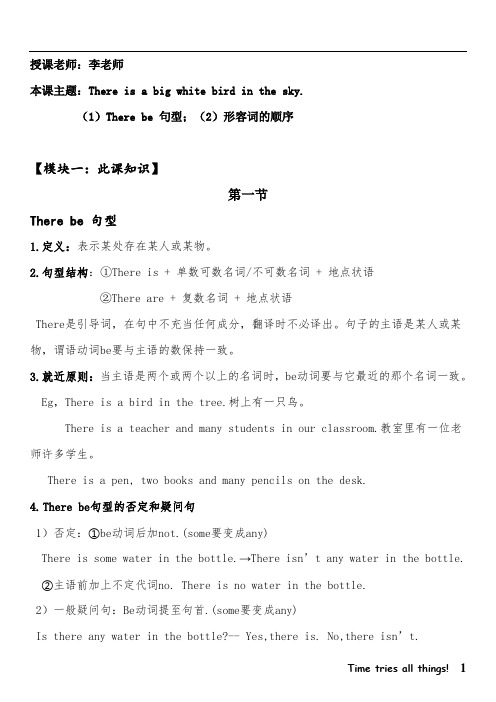
授课老师:李老师本课主题:There is a big white bird in the sky.(1)There be 句型;(2)形容词的顺序【模块一:此课知识】第一节There be 句型1.定义:表示某处存在某人或某物。
2.句型结构:①There is + 单数可数名词/不可数名词 + 地点状语②There are + 复数名词 + 地点状语There是引导词,在句中不充当任何成分,翻译时不必译出。
句子的主语是某人或某物,谓语动词be要与主语的数保持一致。
3.就近原则:当主语是两个或两个以上的名词时,be动词要与它最近的那个名词一致。
Eg,There is a bird in the tree.树上有一只鸟。
There is a teacher and many students in our classroom.教室里有一位老师许多学生。
There is a pen, two books and many pencils on the desk.4.There be句型的否定和疑问句1)否定:①be动词后加not.(some要变成any)There is some water in the bottle.→There isn’t any water in the bottle.②主语前加上不定代词no. There is no water in the bottle.2)一般疑问句:Be动词提至句首.(some要变成any)Is there any water in the bottle?-- Yes,there is. No,there isn’t.回答:Yes,there is/are. No,there isn’t/aren’t.3)特殊疑问句:①指物用”What’s(there)…”; 指人用”Who’s(there)……”Eg,There are some bikes in the room.(对划线部分提问)What’s (there)in the room?There is a boy in the house.Who’s (there)in the house?②主要有How many和How much作引导词的两种情况。
【提优拔尖】小学英语五升六暑假讲义:专题四----一般过去时(二)译林版三起

暑期专题四----- 一般过去时(二)一、一般过去时的易错知识点总结1. cut; put; read; cost的过去式不变,当主语是第三人称,一定要注意是过去时还是一般现在时;如:Tom put the book down and went to bed.2. 要会区分did是助动词还是实意动词;如:They didn’t do the housework last night.3. 如果句子是自然规律,不论何种时态,用一般现在时;如:My teacher told me the ear th is round.4. 句首是填写was; were还是did; 一定要看后面句子,是介词短语则用was; were;是实意动词则用did; 如:Was he at home? Did he stay at home?5. 句中没有具体的时间标识时,要学会上下文的语境。
如:He went to school when his mother went to work.A. 表示这一阶段正在进行的动作。
(标志词:these days)如:They are writing some stories these days.B. 一些动词没有现在进行时。
(have表示“有”;感官动词:look; sound; taste; feel等)如:The music sounds great now.C. 描述图片中的动作,用进行时能够更加形象生动。
如:Look at the picture. The boy is playing the football.D. there; here引出的句子常用一般现在时替代进行时。
如:Here comes the bus.E. 根据上下文语境如:Where is your sister? --- She is watching TV.注意:一般不能用于现在进行时的动词①表示感觉的动词,如see,hear等②表示喜欢或厌恶的动词,如like,love,hate等;表示希望的动词,如wan t,would like等③表示状态的动词,如be, live, keep等④表示归属的动词,如have(拥有), belong to等⑤表示思维,知识或理解能力的动词,如know,think(认为),forget等批注:前两点比较常见,后三点不是很常见,仅作了解。
小学英语外研版五升六学习资料
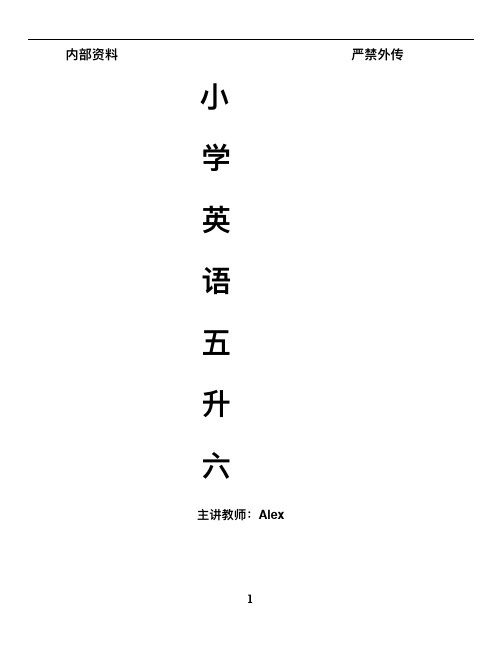
内部资料料严禁外传⼩小学英语五升六主讲教师:Alex五年年级英语下册复习重点(外研版)第⼀一模块:单词短语1. many years ago 许多年年前2. live in a small house 住在⼀一所⼩小房⾥里里3. enough food ⾜足够的⻝⾷食品4. how about 怎么样5. lots of buses and cars许多公共汽⻋车与⼩小汽⻋车6. every day 每天7. talk to 和…交谈8. miss China 想念中国9. four years ago 四年年前10. last night 昨天晚上11. a television programme about China ⼀一个关于中国的电视节⽬目12. talk about 谈论 13. cook on a fire 在炉⽕火上做饭14 work in the fields 在⽥田地⾥里里劳作句句型1、There was(were)+某⼈人或某物+某地2、过去式:We didn’t have enough food .句句型:肯定句句:主语+动词过去式+其他否定句句:主语+be动词过去式+not+其他或主语+did not+动词原形+其他第⼆二模块:短语1. in lots of Chinese cities 在许多中国城市2. foreign language 外语3. learn English 学习英语4. welcome to Beijing 欢迎到北北京来5. make a cake 做蛋糕6. do homework 做家庭作业7. in his class 在他的班级8. a good pupil ⼀一个好学⽣生9. study hard 努⼒力力学习10. an English teacher ⼀一位英语⽼老老师11. walk to school ⾛走路路去学校12. by school bus 乘坐校⻋车句句型1、询问他⼈人做过某事的句句型及回答句句型例例:Did she learn any foreign languages?问:Did+主语+动词原形+其他答:Yes ,⼈人称代词主格+did .或No ,⼈人称代词主格+didn’t .2、描述他⼈人做过某事例例:She learnt English . 主语+动词过去式+其他3、描述他们现在在做某事例例:He is learning English now .主语+be+动词ing+其他第三模块:短语1.have got 拥有2.an e-mail from Linglin⼀一封来⾃自玲玲的电⼦子邮件3.about English food 关于英国⻝⾷食物4.have an English breakfast 吃了了⼀一顿英式早餐5.have …for lunch 吃…作为午餐6.a traditional English dinner ⼀一顿传统的英式晚餐7.very different ⾮非常不不同8.give …to … 把…给…9.at school 在学校10.cook Chinese food for Lingling 为玲玲做中式⻝⾷食物11.be going to 打算12.tell a story 讲故事句句型1、描述吃过某些⻝⾷食物:主语+ had + ⻝⾷食物名称+ 其他2、询问他⼈人打算吃/喝喝什什么:What are you going to eat/drink ?3、询问他⼈人三餐吃了了什什么:What + did + 主语+ have + for breakfast / lunch / dinner ?第四模块:单词短语Library 图书馆; find 找到; CD-ROM 电脑光盘; bring带来; use使⽤用; card 卡⽚片; easy简单的; information信息; timetable时间表; dictionary字典; newspaper 报纸.1. want to 想要2. make an e-card for Mum 为妈妈制作⼀一张电⼦子卡⽚片3. be good at 擅⻓长4. go to the library 去图书馆5. find a book about e-cards 找到⼀一本关于电⼦子卡⽚片的书6. at the library 在图书馆7. the book about computers 关于电脑的书8. on Shelf C 在C架上9. library card 借书卡10. bring back 带回来11. in two weeks’ time 在两周时间内12. use our computer 使⽤用我们的电脑13. be easy with ⽤用……很简单14. find out 找到、找出15. in this dictionary 在这本词典⾥里里16. on this CD-ROM 在这张光盘上17. in this newspaper 在这张报纸上18. at the zoo 在动物园19. on TV 在电视上句句型询问某物在何处及回答的句句型:1、Where are the…about…,please ?2、Where can you find out about …?3、You can find out … in / on …第五模块短语1. take it to China 带它到中国2. buy you a new one 给你买⼀一个新的3. this black bag 这个⿊黑包4. two pockets 两个⼝口袋5. big and light ⼜又⼤大⼜又轻6. be easy for you 对你来说很容易易7. at the department store 在百货商店8. a panda on it 有⼀一个熊猫在上⾯面9. be too…for 对…来说太… 10. take…to… 把…带到…句句型1、描述事物特征的句句型:It’s get… (big反义small; heavy反义light; easy反义hard)2、表达看法:It’s + 形容词+ for +⼈人称代词宾格第六模块短语1. of course 当然2. photos of China 中国的照⽚片3. in the west of China 在中国的⻄西部4. go there 去那⼉儿5. last year 去年年6.go with your mother and father 和你的妈妈、爸爸⼀一起去7. stay with 和…呆在⼀一起8. in July 在七⽉月9. live there 住在那⼉儿10. every year 每年年11. Li people 黎族⼈人12. visit her friend 拜访她的朋友13. ride a horse 骑⻢马14. climb the Tianshan Mountain 爬天⼭山15. visit the Tianchi Lake 参观天池16. have a lovely time 度过⼀一段愉快的时光17. a lot of /lots of 许多句句型1、⼈人称代词和物主代词的区别和⽤用法;2、⽤用⽅方位词表达地点:It’s in the north / south / east / west of….第七模块短语1. send an email 发送电⼦子邮件2. a computer message 电脑信息3. from…to … 从…..到…..4. a good idea ⼀一个好主意5. an idea ⼀一个主意6. click on 点击7. write your message 写你的信息8. at work 在⼯工作9. an email from little Tom ⼀一封来⾃自⼩小Tom的电⼦子邮件10. make a poster 制作海海报 11. thank you for… 为……⽽而感谢12. work hard 努⼒力力⼯工作13. at the office 在办公室14. be busy 忙碌的15. be home 在家16. at seven o’clock 在七点钟17. on the train 在⽕火⻋车上18. stand up 起⽴立19. run to the blackboard 跑向⿊黑板20. on the blackboard 在⿊黑板上句句型1、another和the other : another⽤用于三者以上的“其中⼀一个”,the other⽤用于两者之间2、英语时间的表达:①10:00 ten o’clock ②1:58 one fifty-eight③7:10 ten past seven ④9:48 twelve to ten⑤4:45 a quarter to five ⑥9:30 half past nine第⼋八模块短语1. come quickly 快来2. on the phone 在通话中3. be excited 激动的4. in the summer 在这个夏天5. take a present for my cousin 为我的堂弟带⼀一份礼物6. a Chinese dragon kite ⼀一个中国⻰龙的⻛风筝7. the same as 与…..相同8. I think so ./I don’t think so. 我认为这样./我认为不不这样9. go to a party 去参加聚会10. wear a beautiful dress 穿着漂亮的⾐衣服句句型1、表示建议的⼏几种⽅方法:(1)What about …. ? ……怎么样?(2)Why don’t you … ? 你为什什么不不……呢?(3)How about … ? ……怎么样?2、形容词⽐比较级的构成:第九模块短语1. in English ⽤用英语2. last week 上周3. go to a children’s theatre 去⼉儿童剧院4. wear women’s clothes 穿⼥女女⼈人的⾐衣服5. wear men’s clothes 穿男⼈人的⾐衣服6. tell jokes/ tell a joke 说笑话7. laugh a lot ⼤大笑,笑个不不停8. after the show 表演之后9. go to a restaurant 去餐馆10. be ready for….. 为……做好了了准备11. your trip to America 你去美国的旅⾏行行12. last night 昨天晚上13. in three weeks /in three weeks’ time 在3个周的时间内14. buy …for… 为……买……15. a book about Chinese history ⼀一本关于中国历史的书16. ask you some questions 问你⼀一些问题17. borrow a bike for you 为你借⼀一辆⾃自⾏行行⻋车18. CDs of Chinese songs 中国歌曲的光盘19. listen to 听20. in the evenings 在晚上21. See you soon. 再⻅见句句型描述某⼈人过去、现在、将来做某事:1、主语+ 动词过去式+ 其他2、主语+ be + 动词ing + 其他3、主语+ be going to + 其他第⼗十模块短语1. feel nervous 感到紧张2. make a list of things to do 列列⼀一个要做的事情的清单3. go to the airport 去⻜飞机场4. this weekend 这个周末5. go there 去那⼉儿6. at the airport 在⻜飞机场7. in a yellow taxi 乘⼀一辆⻩黄⾊色的出租⻋车8. tall buildings ⾼高楼9. speak English/Chinese 说英语/汉语10. make Chinese food for me为我制作中国的⻝⾷食物句句型“will + 动词原形”表示将来的动作或状态,构成⼀一般将来时态。
五升六必备语法 代词

三、用适当的物主代词填空: 1.__________math teacher is Mr Wang. (our; ours) 2. This is not my shirt. Please give me__________. (my; mine)
2
3. These are__________books.(his; he).__________is on the desk. (my; mine) 4. I can’t find__________pens. (my; mine) Can I use__________? (your; yours) 5. The red coat is__________. (her; hers) 6. Is__________brother a student? (his; he) 7. Are these bananas all__________? (our; ours) 8. This is not my notebook.__________is green. (my; mine) 9. --Is this__________schoolbag?(your; yours) --No, it’s not__________. (my; mine) 10. Here are many rulers. Which one is__________? (her; hers)
1
二、物主代词
类别
单数 第一人称 第二人称
第三人称
形容词性 my
your
his her its
名词性 mine
your
his hers its
*形容词性物主代词后一定要接名词。
*名词性物主代词可以单独使用。
五升六英语短期语法专题

五升六语法专辑英语基础语法课程练习册1. 语法:一般现在时Warming-up表示经常的,习惯性的动作,常与表示频率的时间副词连用。
1. 表示经常性或习惯性的动作:I get up at six every day.2. 表示事物和人物的特征.状态:The sky is blue.3. 表示客观事实:The earth goes around the sun.关键词:day once, twice, three timesyear four times a weekmonth on Saturdaysevery week on Sundaysmorningafternoonevening句型:1. be 动词的变化肯定式:He is a teacher.否定式:He is not a teacher.一般疑问句:Is he a teacher? -Yes, he is. / No, he isn't.特殊疑问句:What is he?2. 行为动词的变化肯定式:I like pork. 第三人称单数:He likes pork.否定式:I don't like pork. 第三人称单数:He doesn't like pork.一般疑问句:Do you like pork? 第三人称单数:Does he like pork?-Yes, I do. / No, I don't. –Yes, he does. / No, he doesn't.特殊疑问句:What do you like? / What does he like?课堂巩固一. 将下列动词改为第三人称单数形式。
Model: do→ does1. fly _______2. skip _______3. play _______4. wash _______5. go _______6. watch _______7. study _______8. swim _______9. skate _______二. 用所给动词的适当形式填空。
五升六英语讲义
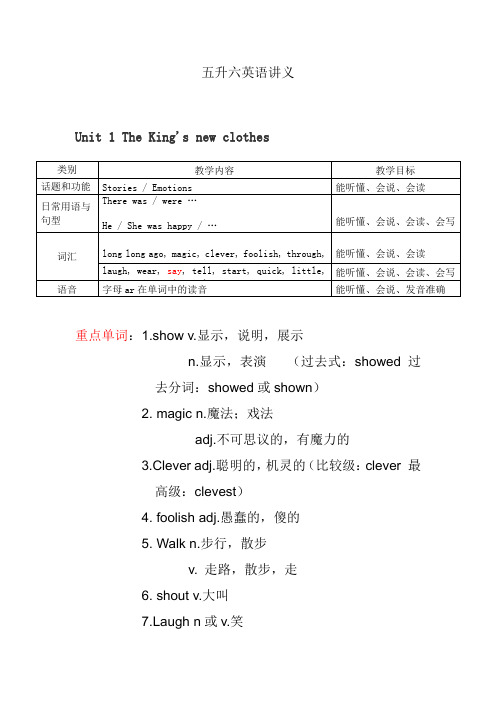
五升六英语讲义Unit 1 The King's new clothes重点单词:1.show v.显示,说明,展示n.显示,表演(过去式:showed 过去分词:showed或shown)2. magic n.魔法;戏法adj.不可思议的,有魔力的3.Clever adj.聪明的,机灵的(比较级:clever 最高级:clevest)4. foolish adj.愚蠢的,傻的5. Walk n.步行,散步v. 走路,散步,走6. shout v.大叫ugh n或v.笑8. point n.要点,得分v.指向9. Pick v.采摘,摘,拾取10.live adj.活的,生动的v.居住,活,度过11. Give v.给,给予12.be (be动词,即am,is are)重点词组:1.make clothes for sb为某人做衣服2. show sb sth 向某人展示某物3. Try on sth 试穿上。
4. walk through穿过5.Look at 看向6.point at 指向7. Live in 住在8.in front of在。
前面9.Give sb sth 给某人什么10. live with sb和某人住一起11. Be nice to sb 对某人很好12.be sick生病了13. Look after 照顾14. turn into变成重点句型:1.the king walked through the city in his new clothes.(walk through表示“穿过”,through指的是穿过某个空间,比如through forest ; inone’s clothes表示穿着谁的衣服)2.they looked at the king and shouted: whatbeautiful clothes!(look at表示看向某人,looked和shouted是同发生的动作,应该保持失态一致!what表示“多么”,不是“什么”的意思。
小学五升六 英语讲义
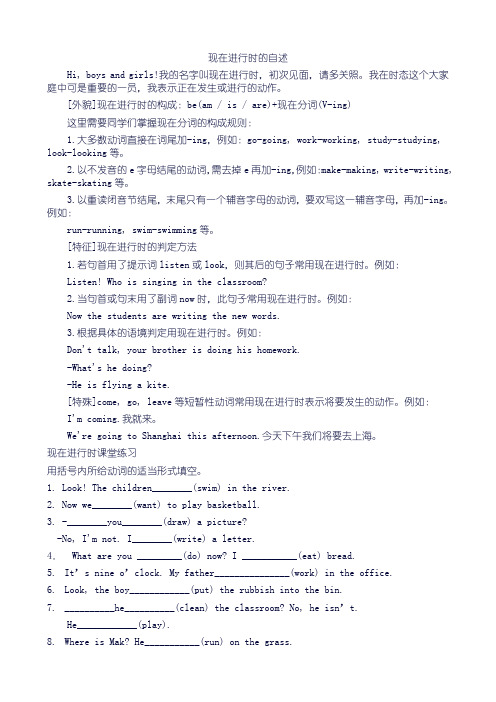
现在进行时的自述Hi, boys and girls!我的名字叫现在进行时,初次见面,请多关照。
我在时态这个大家庭中可是重要的一员,我表示正在发生或进行的动作。
[外貌]现在进行时的构成:be(am / is / are)+现在分词(V-ing)这里需要同学们掌握现在分词的构成规则:1.大多数动词直接在词尾加-ing,例如:go-going, work-working, study-studying, look-looking等。
2.以不发音的e字母结尾的动词,需去掉e再加-ing,例如:make-making, write-writing, skate-skating等。
3.以重读闭音节结尾,末尾只有一个辅音字母的动词,要双写这一辅音字母,再加-ing。
例如:run-running, swim-swimming等。
[特征]现在进行时的判定方法1.若句首用了提示词listen或look,则其后的句子常用现在进行时。
例如:Listen! Who is singing in the classroom?2.当句首或句末用了副词now时,此句子常用现在进行时。
例如:Now the students are writing the new words.3.根据具体的语境判定用现在进行时。
例如:Don't talk, your brother is doing his homework.-What's he doing?-He is flying a kite.[特殊]come, go, leave等短暂性动词常用现在进行时表示将要发生的动作。
例如:I'm coming.我就来。
We're going to Shanghai this afternoon.今天下午我们将要去上海。
现在进行时课堂练习用括号内所给动词的适当形式填空。
1. Look! The children________(swim) in the river.2. Now we________(want) to play basketball.3. -________you________(draw) a picture?-No, I'm not. I________(write) a letter.4.What are you _________(do) now? I ___________(eat) bread.5.It’s nine o’clock. My father_______________(work) in the office.6.Look, the boy____________(put) the rubbish into the bin.7.__________he__________(clean) the classroom? No, he isn’t.He____________(play).8.Where is Mak? He___________(run) on the grass.9.Listen, who____________(sing) in the music room? Oh,Mary_____________(sing) there.将下列句子改成现在进行时1. Tom can speak Chinese.2. We have four lessons.3. I watch TV every day.4. She works in a hospital.5. Do you like this book?6. Kitty and Ben have lunch at about twelve.7. His father can help them.8. Danny, open the door.9. They watch TV in the evening.现在进行时课后练习一、选择填空:( )1. Look! LiPing and Li Ying ________ basketball now.A. playB. playsC. are playing( )2. Can I______ this book?A. haveB. hasC. having( )3. I to music at 7:00 this morning.A. listenB. listeningC. listens( )4. What ______ that in the box? A shirt.A. amB. isC. areD. be( )5. Can I TV? Sure.A. watchingB. watchC. see( )6、She like swimming.A. doesn'tB. don'tC. isn't.( )7. Here the money.A. areB. isC. am( )8. There _______ a table and two chairs in Jenny’s room.A. amB. isC. are二、用动词的适当形式填空。
五升六英语
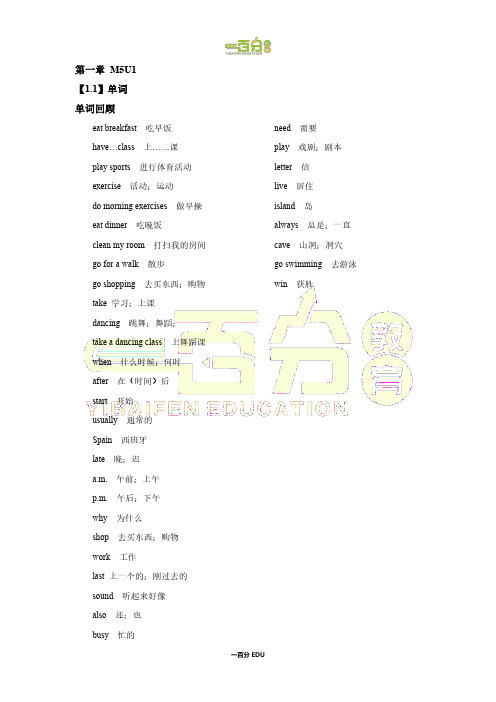
need 需要 play 戏剧;剧本 letter 信 live 居住 island 岛 always 总是;一直 cave 山洞;洞穴 go swimming 去游泳 win 获胜
一百分 EDU
Activities(活动) get up 起床 do morning exercises 晨练 have English class 上英语课 play sports 进行体育活动 play the piano 弹钢琴 go shopping 购物 go hiking 去远足 eat breakfast 吃早饭 eat dinner 吃晚饭
8 上舞蹈课____________
一百分 EDU
9 去散步____________ 11 起床________________ 13 打乒乓球________________ 15 做家庭作业________________
10 吃做饭________________ 12 在周末________________ 14 go swimming________________
△句型: ①询问做某事在几点 When do you+动词原形(短语)+其他? ——° At +时间 ——° I(+频度副词)+动词原形(短语)+at+时间。 例句:When do you get up in the morning? ——° At 7:30. ——° I often get up at 7:30. ②询问周末的活动安排
dinner. Shopkeeper: You’re so busy! You need a robit to help you! 5 、Let me see. From Monday to Wednesday, I usually collect nuts in the afternoon.
小学五升六年级英语知识 50个常用口语,暑假背诵
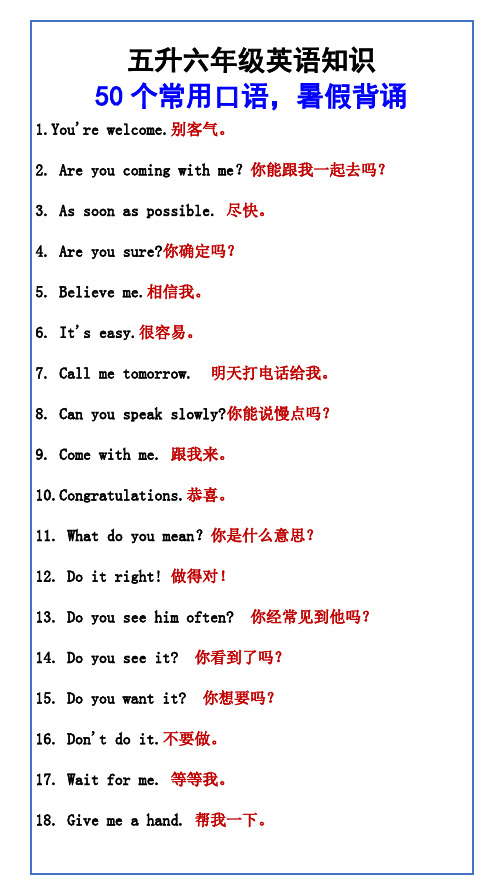
1.You're welcome.别客气。
2. Are you coming with me?你能跟我一起去吗?3. As soon as possible. 尽快。
4. Are you sure?你确定吗?5. Believe me.相信我。
6. It's easy.很容易。
7. Call me tomorrow. 明天打电话给我。
8. Can you speak slowly?你能说慢点吗?9. Come with me. 跟我来。
10.Congratulations.恭喜。
11. What do you mean?你是什么意思?12. Do it right! 做得对!13. Do you see him often? 你经常见到他吗?14. Do you see it? 你看到了吗?15. Do you want it? 你想要吗?16. Don't do it.不要做。
17. Wait for me. 等等我。
18. Give me a hand.帮我一下。
19. Where are you going?你去哪里?20. That’s right. 对了。
21. Tell me.告诉我。
22. Have you finished?你做完了吗?23. That happens. 会发生,碰巧,恰巧。
24. I'm ready. 我准备好了。
25. Let me see.让我想想。
26. How long are you staying?你要待多久?27. I think so. 我认为是这样的。
28. It's nothing.没什么。
29. I can do it.我能做。
30. I can't believe it.我简直不能相信。
31. I'm hungry. 我饿了。
32. I don't know anybody.我一个人都不认识。
小学英语升学知识点总结

小学英语升学知识点总结一、语法知识1. 词类名词:表示人、事物、地点或抽象概念的名称,如:apple, book, girl, China等。
形容词:用来修饰名词或代词,表示人或事物的性质、特征或状态,如:big, small, nice 等。
动词:表示动作或状态的词,如:run, jump, is, am等。
副词:用来修饰动词、形容词或其他副词,表示时间、地点、方式、程度等,如:well, slowly, quickly等。
代词:代替名词使用,如:he, she, it, they等。
介词:表示事物的位置、方向、时间等关系词,如:in, on, under, at等。
连词:用来连接词语、短语、句子等,构成句子的成分,如:and, but, or等。
数词:表示数目、顺序、比例等概念的词,如:one, two, first, second等。
冠词:用来限定名词或名词短语,包括不定冠词a/an和定冠词the。
2. 句子结构英语句子的基本结构是主语+谓语+宾语。
主语表示动作的承受者,谓语表示动作或状态,宾语表示动作的对象。
主语+谓语: I play.主语+谓语+宾语:I watch TV.主语+谓语+宾语+宾语补足语:She gives me a book.二、词汇积累1. 动词be是最常用的动词,它有多种形式:am(我是)、is(他、她、它是)、are(我们、你们、他们是)。
have是表示“有”的动词,也有多种形式:has(他、她、它有)、have(我、你、我们、他们有)。
常用的动词还包括play(玩)、run(跑)、eat(吃)、drink(喝)、go(去)、come (来)、watch(看)、read(读)、write(写)等。
2. 名词名词可以分为可数名词和不可数名词。
可数名词可以用数目来计算,如apple, book, boy 等;不可数名词不能用数目来计算,如milk, water, rice等。
五升六英语知识要点

一、问职业:What be + 主语?= What does /do +主语+do?eg. He is a teacher.(提问)_____? _____ he _____?二、表方式的短语1)on foot 2)by + 交通名词单数(无冠词)= in / on a (the; 物主代词;名词所有格)eg. 1、by bike = on a bike? by car = in a car?2、He goes to work by a bike every day.(改错)? _____________三、区别:have to : 有外部条件强加的客观上的“不得不” (存在各种时态)must: 个人主观上认为“必须”(无时态变化)eg. 1、I ___ stop on the way because of the rain.2、I ____ stop because I’m a little tired.四、提建议1、Shall we… ?? 答肯定:Good idea / OK /2、Let’s …???? All right3、Why not… ?? 语否定:No, let’s…? 肯定:Certainly/ Yes, please/另还可回答为Yes, I think so/ I’d love to否定:No,I don’t think so / I’m afraid not.五、put on强调“穿”的动作:穿上,戴上后接wear是put on 之后的结果:穿着? ? “衣服”= be in??? 名词dress sb: 给某人穿衣eg. 1、You’d better ____ more clothes when you go out. It’s cold outside.A. wear ?B. dress? ?C. put on?D. take off? ?2、The boy can _____ himself now. A. wear ? B. dress? C. put on? D. take off? 3、Tom is wearing a red shirt today.六、在具体的某楼前用oneg. He lives on the fifteenth floor.△七、How do you like… ? 你觉得……怎么样?= What do you think of … ?eg. How do you like the new film? = What do you think of the new film? 你觉得这部新电影怎么样?八、a little = a bit 但注意:1) a little+名词= a bit of + 名词)eg.There is a little( a bit of ) water in the glass.九、? marry sb = be married to sb.与某人结婚? get married = be married 已婚;结婚(但get married是“短命”动词,要指“结婚多久”应用be married)eg. 1、She married with a doctor (找错) ______? 2、She has got married for ten years (找错) __________十、leave sth + 地点:把某物忘在某地? forget sth : 忘记某事eg. 1)He ______ the driver’s license yesterday.? 2)I ____ my umbrella in the train just now.十一、感叹句1、What (a, an) + 形+ 名(+主+ 谓)!(注:但名词为不可数、复数时,则不用a / an)2、How + 形/ 副(+ 主+ 谓)!eg.1)________ bad weather!2)______ hard they are working!? 3)______ good girl she is! 4)_____ beautiful flowers they are!十二、“雨大,雪大”heavy---heavily/ hard “风大” strong---strongly?△18.so 句型? ? so + be(助、情) + 主语:“也如此”? ? so + 主语+ be(助、情):“的确如此”Eg.1、I watched TV last night, and so did she. 昨晚我看了电视,她也看了。
专题04 语法-五升六 英语 暑假专项提升(人教pep版)

( B )5.My birthday is on April 5th.
四、单项选择。
( B )1.—________ is the sports meet?
—It's in June.
A. What
B. When
C. Where
( B )2.The English test is in________.
1. My sister lives ____in____ Sichuan. 2. I will eat a birthday cake ____a_t___ the party. 3. I usually play games ___a_t____ 6: 00 a. m. 4. We will go to the Great Wall____in____ October. 5. We will eat mooncakes ___w__it_h__ my grandparents.
(上舞蹈课)
3. —W__h_a_t_d_o__y_o_u_a_l_w_a_y_s_d_o__o_n_S_a_t_u_rd_a_y_?_________ —I always clean my room on Saturday.(写问句)
4. —What do you often do on the weekend? —_I_o_f_te_n__g_o_s_h_o_p_p_i_n_g_w__it_h_m__y_m__u_m_._(_答__案__不__唯__一__)_ (根据实际情况回答问题)
B. It's warm.
C. I can play with snow.
Unit3语法复习
介词in, at, on与时间搭配的基本规则
广州版五年级升六年级前三种时态总结
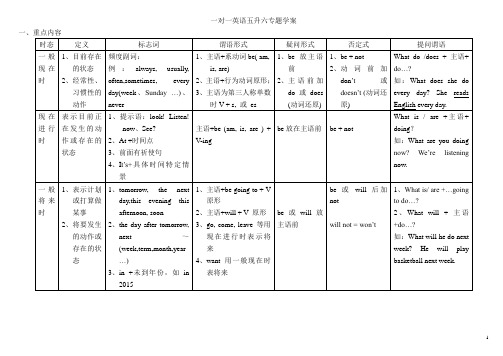
一对一英语五升六专题学案一、重点内容时态定义标志词谓语形式疑问形式否定式提问谓语一般现在时1、目前存在的状态2、经常性、习惯性的动作频度副词:例:always, usually,often,sometimes, everyday(week、Sunday …)、never1、主语+系动词be( am,is, are)2、主语+行为动词原形;3、主语为第三人称单数时V + s, 或es1、be 放主语前2、主语前加do 或does(动词还原)1、be + not2、动词前加don’t 或doesn’t (动词还原)What do /does + 主语+do…?如:What does she doevery day? She readsEnglish every day.现在进行时表示目前正在发生的动作或存在的状态1、提示语:look! Listen!now、See?2、At +时间点3、前面有祈使句4、I t’s+具体时间特定情景主语+be (am, is, are ) +V-ingbe放在主语前be + notWhat is / are +主语+doing?如:What are you doingnow? We’re listeningnow.一般将来时1、表示计划或打算做某事2、将要发生的动作或存在的状态1、tomorrow, the nextday,this evening thisafternoon, soon2、the day after tomorrow,next ~(week,term,month,year…)3、in +未到年份,如in20151、主语+be going to + V原形2、主语+will + V 原形3、go, come, leave 等用现在进行时表示将来4、want 用一般现在时表将来be 或will 放主语前be 或will 后加notwill not = won’t1、What is/ are +…goingto do…?2、What will + 主语+do…?如:What will he do nextweek? He will playbasketball next week.二、巩固练习一般现在时练习题(一)、用单词的正确形式填空:1.Mike _________ (do) his homework every day.2.There __________(be) some water in the glass.3.We like ________ (play) basketball after class.4.I like singing. I often _________(listen) to the music in the evening.5.My grandma_________(watch) TV every day.(二)、判断句子的正误, 并改正。
五升六英语
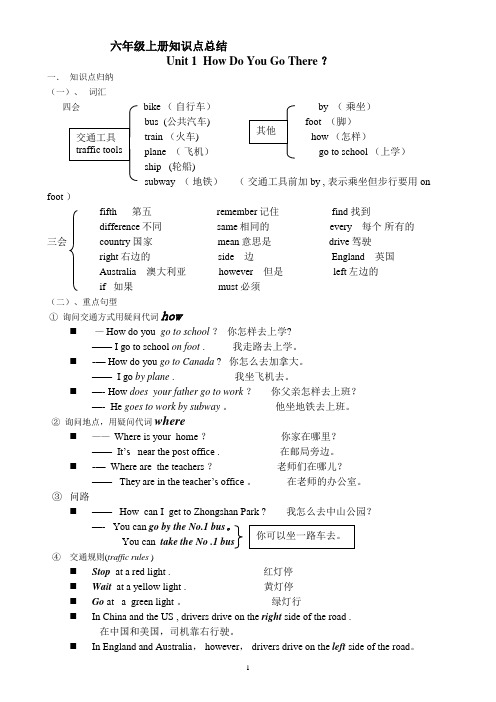
六年级上册知识点总结Unit 1 How Do You Go There ?一. 知识点归纳(一)、 词汇bike ( 自行车)( 乘坐)公共汽车(脚) (火车(怎样) ( 飞机)(上学)轮船)( 地铁) ( 交通工具前加by , 表示乘坐但步行要用onfoot )fifth 第五 remember 记住 find 找到difference 不同 same 相同的 every 每个 所有的三会 country 国家 mean 意思是 drive 驾驶right 右边的 side 边 England 英国Australia 澳大利亚 however 但是 left 左边的if 如果 must 必须(二)、重点句型① 询问交通方式用疑问代词how⏹ -— How do you go to school ? 你怎样去上学?—— I go to school on foot . 我走路去上学。
⏹ -— How do you go to Canada ? 你怎么去加拿大。
—— I go by plane . 我坐飞机去。
⏹ —- How does your father go to work ? 你父亲怎样去上班?—- He goes to work by subway 。
他坐地铁去上班。
② 询问地点,用疑问代词where ⏹—— Where is your home ? 你家在哪里? —— It’s near the post office . 在邮局旁边。
⏹ -— Where are the teachers ? 老师们在哪儿?—— They are in the teacher’s office 。
在老师的办公室。
③ 问路⏹ —— How can I get to Zhongshan Park ? 我怎么去中山公园?—- You can go by the No.1 bus 。
You can take the No .1 bus .④ 交通规则(traffic rules ) ⏹Stop at a red light . 红灯停 ⏹Wait at a yellow light . 黄灯停 ⏹Go at a green light 。
小学英译必备知识点总结

小学英译必备知识点总结一、基本句型1. 主谓结构主谓结构是最基本的句子结构,通常由主语和谓语构成,例如:I am a student.(我是一个学生。
)主语是“我”,谓语是“am a student”。
2. 主谓宾结构主谓宾结构由主语、谓语和宾语构成,例如:She watches TV.(她看电视。
)主语是“她”,谓语是“watches”,宾语是“TV”。
3. 主谓宾补结构主谓宾补结构由主语、谓语、宾语和补语构成,例如:I like English.(我喜欢英语。
)主语是“我”,谓语是“like”,宾语是“English”,补语是“英语”。
4. 否定句否定句通常在谓语前加上“don’t”或“doesn’t”,例如:He doesn’t like ice cream.(他不喜欢冰淇淋。
)5. 一般疑问句一般疑问句通常把句子的主语和助动词调换位置,例如:Do you like chocolate?(你喜欢巧克力吗?)6. 特殊疑问句特殊疑问句以特殊疑问词开头,例如:Where do you live?(你住在哪里?)7. 强调句强调句通常用“do”来加强句子成分,例如:She does like animals.(她确实喜欢动物。
)二、词汇1. 动词动词是表示做、动作或状态的词,例如:go(去)、play(玩)、study(学习)等。
2. 名词名词是表示人、事物、地点或抽象概念的词,例如:cat(猫)、school(学校)、friend (朋友)等。
3. 形容词形容词是用来修饰名词的词,例如:beautiful(美丽的)、big(大的)、happy(快乐的)等。
4. 副词副词是用来修饰动词、形容词或其他副词的词,例如:slowly(慢慢地)、well(好地)、very(非常)等。
5. 代词代词用来替代名词,例如:he(他)、she(她)、it(它)等。
6. 介词介词用来表示名词或代词与其他词之间的关系,例如:in(在)、on(在……上)、under (在……下面)等。
- 1、下载文档前请自行甄别文档内容的完整性,平台不提供额外的编辑、内容补充、找答案等附加服务。
- 2、"仅部分预览"的文档,不可在线预览部分如存在完整性等问题,可反馈申请退款(可完整预览的文档不适用该条件!)。
- 3、如文档侵犯您的权益,请联系客服反馈,我们会尽快为您处理(人工客服工作时间:9:00-18:30)。
一、词类:
1、名词这里强调两点:不可数名词都默认为单数,所以总是用is
名词复数如何加后缀:
2、人称代词和物主代词
人称代词:有主格和宾格之分。
一般动词前用主格,动词后用宾格。
3、指示代词
4、冠词a、a n、the
a和an的区别:an用于元音音素(一般就是元音字母a、e、i、o、u)前,,a用于辅音音素前。
二、否定句:
be动词(am、is、are)+not
情态动词can+ not
助动词(do、does)+ not
如何将一个肯定的陈述句改为否定句
1、看句中有无be动词,如有,直接在be动词后+ not。
2、看句中有无情态动词,如有,直接在情态动词后+ not。
3、如上述二者都没有,就应用助动词+ not。
分四个步骤:
(1)肯定陈述句中本来是没有助动词的,要加上去,位置在主语(某人或某物)后,动词前。
(2)确定助动词用do、does,根据句中动词,动词是原形的助动词就用do,动词
是第三人称单数的助动词就用does,
(3)在助动词后加not。
(4)原句中动词假如发生变化就要恢复成原形。
强调一点,有some的要考虑是否要用any。
三、一般疑问句。
如何将一个肯定的陈述句改为一般疑问句:
1、看句中有无be动词,如有,把be动词提到句首即可。
2、看句中有无情态动词,如有,把情态动词提到句首即可。
3、如上述二者都没有,就应把助动提到句首。
分四个步骤:
(1)肯定陈述句中本来是没有助动词的,要加上去,位置在主语(某人或某物)后,动词前。
(2)确定助动词用do还是does,根据句中动词,动词是原形的助动词就用do,动词是第三人称单数的助动词就用does
(3)把助动词后提到句首。
(4)原句中动词假如发生变化就要恢复成原形。
强调一点,有some的要考虑是否要用any。
四、特殊疑问句。
表示疑问,有疑问词(在开头),回答有很多种可能。
常用疑问词:
五、时态
1、一般现在时
(1)一般现在时中的be动词:一般用原形:am、is 、are
am用于第一人称单数(I);is用于第三人称单数(he 、she 、it和其他人名或称谓,如:Ben 、his 、sister等);are用于第二人称单数(y ou)和所有复数(包括第一人称复数we、第二人称复数y ou;第三人称复数they和其他复数,如
the children 、 his 、parents等)。
(2)一般现在时中的动词:
第一种情况:主语是第三人称单数(he、she 、it 和其他,如Helen 、
her cousin 等),动词后一般加s或es。
第二种情况:主语不是第三人称单数,动词都用原形。
(3)一般现在时判断依据(如何判断一个句子是一般现在时):
△be动词是am、is、are
△动词用原形或加s、es
△没有时间状语或有usually、often、everyday、sometimes等不是具体的时间
2、现在进行时
(1)构成形式:Be动词+动词的ing形式
这里强调一点,两者缺少其中任何一种都不可以构成现在进行时。
(2)现在进行时表示动作正在进行或事情正在发生。
(3)有用的依据:一个句子中既有be动词,又有动词,且动词加了ing ←→该句是现在进行时
(4)句中往往有now、look、listen等词。
动词现在分词的变化见下表:
同音词:too---two----to buy---by I---eye
four----for there----their right----write sun----son
no----know here---hear who’s----whose
近义词: many----a lot of / lots of large----big desk----table photo---picture lamp----light like----love
反义词或对应词:old----new go----come big----small
open----close black----white here----there
完整形式:let’s=let us(让我们) I’d=I would can’t=can not I’m=I am 词性变换:one(序数词) first
monkey(复数)monkeys
skiing(原形) ski
is(复数)are
families(单数)family
make(现在分词)making
we are(缩略形式) we’re
do(第三人称单数) does
have(第三人称单数) has
photo(复数) photos
fat(反义词) thin
3、一般过去时
定义:表示过去发生的行为或状态,这种时态往往都有一个明确的过去时间状语,如:yesterday,last week(month,year)等,或联系上下文能确切知道行为发生
在过去,其谓语用过去式。
(1)一般过去时中的be动词:was were was用于第一人称(I)和第三人
称单数(he she it和其他人名或称谓),were用于第二人称单数(you)和所有复数(包括第一人称复数we、第二人称复数you;第三人称复数they和其他复数,如the children 、 his parents等)。
(2)在动词后面加ed。
动词过去式的构成规则:
一般情况,直接加ed,clean—cleaned,finish—finished,want—wanted, watch—watched。
以不发音字母“e”结尾的加d,move—moved,live—lived,arrive—arrived。
以“辅音字母+y”结尾的,变y为i,再加ed,study—studied,cry—cried,try —tried。
注意,“以元音字母+y”结尾的,直接加ed,play—played。
以重读闭音节结尾,结尾只有一个元音字母加一个辅音字母的,双写最后一个辅音
字母再加ed。
是stop—stopped,drop—dropped。
做题目时一定要记住:
1. can+ 动词原形
2. like+动词ing
3.like+名词复数
4.play+足球类play the +乐器类
5.how many +名词复数
6.would like +to+动词原形
7.let’s+动词原形
8.现在进行时:be(am,is,are)+动词ing
9. 动词第三人称单数形式
否定句:be动词(was、were)+not、助动词(did)+not+动词原形
疑问句:was/were +主+其他? Did +主+动原+其他?
特殊疑问句:特殊疑问词+一般疑问句?
be动词
主讲与人称代词的搭配
1、基本形式:am、are、is
(1)am 第一人称I+am
(注意:“I”无论何时都要大写,不管位于句首还是句中)
例:I am a beautiful girl.I am twenty.
(2)are第二人称you+are; 一人称复数we+are;三人称复数
they+are 其他复数名词+are (注意:第二人称单复数同形,都为you)
例:You are my good friend. We are in the same class.
They are on the road. The books are on the desk.
(3) is 第三人称he(男) +is she(女)+is; it(不是人)+is;其他单数名词+is
例:He\She is a good student. It is a white cat. A dog is on that street.
2、肯定、否定、疑问(等于号后是简写)
例:I am(not) from London.
My eyes are(not) small.
My hair is(not) long.
Am I a Chinese? 回答:肯定:Yes, you are. 否定:No, you aren’t.
Is the cat fat? 回答:肯定:Yes, it is. 否定:No, it isn’t.
注意:在一般疑问回答中,肯定回答除
I’m不可简写, 否定回答均可简写。
另:特殊疑问句中:where\how\who\what\why+be动词+人称代词或名词?例:What is your name? My name is GaoBuHan.
Where are you? I’m in the classroom。
